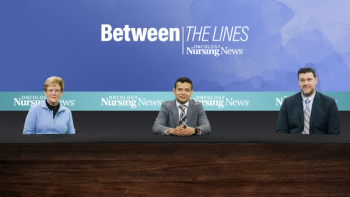
Oncology nurses and APPs can enhance patients’ comfort by counseling patients on what integrative care is and working to make those options accessible.

Oncology nurses and APPs can enhance patients’ comfort by counseling patients on what integrative care is and working to make those options accessible.

Panelists discuss how chronic myeloid leukemia (CML) treatment has evolved over the past 5 years, highlighting advancements in tyrosine kinase inhibitor (TKI) therapy, improved adverse effect management, tailored treatment approaches through molecular monitoring, and increased emphasis on shared decision-making with patients.

Using liquid biopsies to test for ESR1 mutations in breast cancer is more feasible for patients and has quicker turnaround times.

Practicing at top of licensure can create opportunities for oncology APPs to engage with patients and other providers in new ways.

Experts discuss how, it is crucial to approach treatment strategies with both compassion and transparency. It is important to explain the complexity of the situation and maintain clear and accessible language when discussing treatment strategies with patients and their families.

Experts discuss how, there is a role for SRS in treating brain metastases such as if a patient were to have a large singular brain metastasis that is causing symptoms such as seizures of neurological decline, that SRS could be a warranted treatment.

Working with patients in new contexts can provide meaning for oncology PAs, potentially reducing burnout, according to Eric Tetzlaff, MHS, PA-C, DFAAPA.

Katherine Cohen, MSN, FNP-C, provided insights on what to consider when treating patients with HR+, HER2- breast cancer in the second line of treatment.

Experts discuss optimizing renal cell carcinoma (RCC) treatment by integrating patient-reported outcomes and clinician insights.

Experts discuss patient-reported outcomes from the TiNivo-2 trial, focusing on quality of life and the treatment experience.

Experts discuss survival data from the TiNivo-2 phase 3 trial and practical approaches to dose management in clinical practice.

Experts discuss optimizing VEGFR-tyrosine kinase inhibitor (TKI) therapy, focusing on patient selection and management strategies in the clinical setting.

Experts discuss the efficacy profile of tivozanib monotherapy and clinical management strategies in advanced renal cell carcinoma (RCC).

Experts discuss the rational treatment selection of the VEGFR-tyrosine kinase inhibitor (TKI) tivozanib following progression after immune checkpoint inhibitor (ICI) therapy.

Documentation is especially important for nurse practitioners in cancer research and can lead to improved patient recruitment, says an expert.

Experts discuss sequencing strategies in renal cell carcinoma (RCC), focusing on optimizing treatment selection after immune-oncology (IO)–based therapy.

Experts discuss first-line treatment strategies for renal cell carcinoma (RCC) in 2025, navigating the evolving therapeutic landscape.

Experts discuss how, nearly half of patients diagnoses with HER-2 positive metastatic brain cancer do develop brain metastasis. It is thought that larger molecule treatments such as the monoclonal antibodies likely do not cross an intact blood brain barrier which is often why patients develop brain metastases


Experts discuss how to facilitate open communication among the patient, caregivers, and the multidisciplinary team to ensure comprehensive care and alignment on treatment goals.

Experts discuss how they collaborate with oncologists, nutritionists, and other specialists to manage complex cases involving advanced disease and treatment-related adverse effects (AEs) and the role of the multidisciplinary team in addressing specific patient needs, such as nutritional deficits, pain management, or psychosocial challenges.

Experts discuss how to manage fatigue, abdominal pain, and other treatment-related symptoms to maintain or improve quality of life for patients undergoing HER2-targeted therapy and share strategies for supporting patients with declining performance status (eg, ECOG performance status [PS] 2) in balancing treatment efficacy with daily functioning.

Jessie Desir, PhD, RN, AMB-BC, OCN, explained that comprehensive disease and treatment education are essential to adherence for patients with breast cancer.

Experts discuss how, discuss patient experiences with an oral chemotherapy regimen, highlighting benefits like treatment autonomy, challenges such as pill burden and gastrointestinal toxicities, and the importance of proactive side effect management and patient education.

Experts discuss treatment options for HER2-positive metastatic breast cancer following progression on trastuzumab deruxtecan (T-DXd), weighing real-world data on tucatinib-capecitabine-trastuzumab versus T-DM1, considering factors such as resistance mechanisms, administration preferences, and side effect management.

Seth Eisenberg, ASN, RN, OCN, BMTCN, explained his research on a toilet cover for oncology nurses to potentially reduce exposure to infectious pathogens and hazardous drugs.

Experts discuss the most common adverse events associated with trastuzumab deruxtecan, how to effectively identify and manage them to minimize treatment interruptions, and how to monitor and address interstitial lung disease (ILD), a known potential adverse effect of trastuzumab deruxtecan.

Experts discuss Megan’s journey with HER2+ upper gastrointestinal (GI) cancer, highlighting key treatment strategies and challenges.

Oncology nurses and APPs provide support and can help to facilitate conversations with patients and families during end-of-life care.

In myeloma treatment, acute CRS is a common but treatable AE associated with CAR T-cell therapy and bispecific antibodies, according to a nurse practitioner.